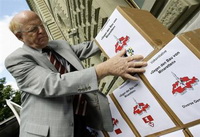Swiss Minaret Ban Can Fear Away with Muslim Investors
The Vatican and an association of Islamic states are concerned that Swiss referendum prohibiting the construction of minarets may hurt trade and banking ties with the Muslim world.

“I hope the Swiss come back on this decision,” French Foreign Minister Bernard Kouchner said in an interview with RTL radio today, adding that he was “shocked” by the result. “You have to ask who is the target, and if the target is sort of moderate Muslims that we always say that we want, then it’s really an error.”
The ban marks the latest turn in Europe’s struggle to assimilate Muslims. In 2005, a Danish newspaper’s publication of a cartoon depicting the Prophet Muhammad with a bomb in his turban prompted protests in Muslim nations and a boycott of Danish products. French President Nicolas Sarkozy this year proposed a ban on burqas, Bloomberg reports.
Meanwhile, the Swiss vote could irk some Muslim investors at a time when Swiss private banks are hoping to replace dwindling growth in European and U.S. assets with fresh funds from emerging markets.
Switzerland has traditionally attracted wealth from the Middle East due to its political stability and proximity to the region. French-speaking Geneva has been the main Swiss hub for Arab clients, bankers say, although no there are no official figures available due to Swiss bank secrecy law.
Top Swiss bankers and politicians sought to reassure the Muslim community on Monday by saying that the ban on the constructions of new minarets in the country was not a vote against the right to profess the Muslim faith, Reuters reports.
It was also reported, at a conference, Hans-Ulrich Meister, head of Switzerland for Credit Suisse Group, played down concerns. Clients in the Muslim countries "typically are huge investors and very professional," he said. "They can differentiate between direct democracy banning minarets and religious freedom, but the political bodies in Switzerland have to explain this."
Nonetheless, the government suggested Swiss business could suffer somewhat as a result of the vote, despite efforts to calm the reaction in Muslim countries. "I am assuming our trade relations with other countries will become more difficult," said Justice Minister Eveline Widmer-Schlumpf at a news conference Sunday evening.
A number of Swiss companies, such as engineering group ABB Ltd and food maker Nestle SA, have large interests in Muslim countries. For instance, food maker Nestle SA has about 50 factories in the Muslim world and is the world's largest producer of halal food, or food permissible under Islamic law. Nestle has recently begun expanding its halal business in Europe, targeting the Continent's growing Muslim population.
"Nestlé cannot be associated with any form of discrimination," the company said in a statement, The Wall Street Journal reports.
Subscribe to Pravda.Ru Telegram channel, Facebook, RSS!





